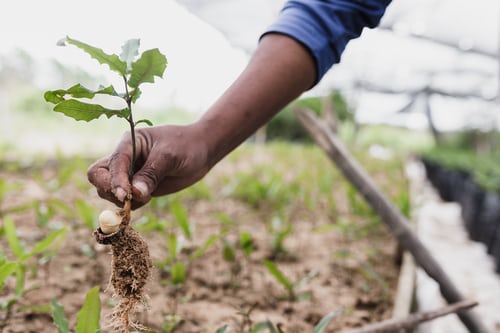13 January 2022
Diddly Squat
Farming furores.
By Lynda Goetz

It was reported this week that Jeremy Clarkson’s Diddly Squat Farm had been denied planning permission for a car park and restaurant, which he had hoped to build to diversify his farming venture. In turning down the application, West Oxfordshire’s District Planning sub-committee cited not only traffic concerns, but the fact that any such development would be out of keeping with the area.
Council planning officer Joan Desmond said: ‘By reason of its siting, design, scale and location, the proposed development would not be sustainable and would not be compatible or consistent in scale with the existing farming business or its open countryside location…. [it] would have a visually intrusive and harmful impact on the rural character, scenic beauty and tranquillity of the area.’ The area is within the Cotswolds Area of Outstanding Natural Beauty (AOB).
Mr Clarkson, well known to television viewers from Top Gear and subsequent Grand Tour programmes, has also achieved record viewing figures with series 1 of Clarkson’s Farm, aired on Amazon Prime last summer. Many have said that the programmes have shown far more about the realities facing farmers than any number of programmes like Country File aired on the BBC. Clarkson has owned the farm since 2008, but decided to take over the running of it in 2019 when the contract farmer retired. He renamed it ‘Diddly Squat’ because ‘that’s how much you make from farming’. At the time he bought it he pointed out that “There are many sensible reasons for this. Land is a better investment than any bank can offer. The government doesn’t get any of my money when I die. And the price of the food that I grow can only go up. But there is another, much more important reason: I can now have a quad bike.”
Apart from the fun derived from riding a quad bike around your 1,000 acres, land is a good investment. There is a finite amount of it for a start and in a country with an expanding population it is always in demand. Making an income from it, however, is another matter.
Prior to World War I, 60% of food in this country was imported. The interruptions of supply to an island at war made it essential that the country become more self-sufficient. As the government became more responsible for food production, the relationship between state and agriculture changed. At the same time, with many farm workers fighting in the trenches, the employment of women and the increased use of mechanisation transformed farming and rural life completely. (The NFU website has some interesting and informative articles on the subject). Unfortunately, once the war was over, food prices fell around the world and farmers were once again left to their own devices; by the mid-1930s agriculture in this country was in poor shape and land prices had dropped.
During World War II, as in the First World War, many acres of pastureland were turned over to arable; intensive and extensive stock farming was encouraged where land was unsuitable for arable and subsidies and grants were made available (National Archives). The policies were successful and not only was the country not starved into submission, but farmers saw their incomes as well as their productivity increase. Since that time subsidies and/or guaranteed prices for basic commodities have continued, initially based on the Agriculture Act 1947 and subsequent legislation, then under EEC and EU Common Agricultural Policy (CAP) arrangements. Since Brexit these are being phased out and replaced by new forms of support set out in The Agriculture Act 2020 (as explained on the Institute for Government website). Much of the detail is still to be formalised in statutory instruments and it is fair to say that many farmers are still not entirely happy with the way things are going.
The last Agriculture Act was in 1993 and a great deal has changed since then. Under that act there was a legal requirement for government to produce an annual report ‘on such matters relating to price support for agricultural produce as they consider relevant’. The last such report Agriculture in the UK 2016, was published in 2017. Under the heading ‘Incomes and Productivity’ it notes that ‘Farm Business Income (FBI) varies greatly with over a quarter of UK farms failing to make a positive FBI whilst 16% of UK farms had a FBI of over £50,000’. In 2020, Clarkson calculated he made just £144.
Now that we have left the EU, we are free once again to devise our own methods of support for agriculture. Agricultural policy is devolved and each of the four governments used to administer subsidies according to EU rules. Scotland has committed to maintaining the CAP system until 2024, whilst Wales appears not to have got much further than publishing the results of an initial consultation, Brexit and our Land, which does little more than put ‘sustainability’ at the heart of any future proposals. Northern Ireland is also for the moment retaining the status quo.
The Agricultural Act 2020 has had a clause inserted which requires government to produce a report, at least every five years, on food security. This is a subject which the current NFU president, Minette Batters (the first female president in National Farmers Union (NFU) history) cares about deeply. Currently, the UK agricultural industry, the bedrock of our food and drink industry, produces 60% of domestic requirements. Ms Batters and the NFU* want to ensure that our self-sufficiency remains at least at this level (which is down from 78% in the mid-80s). In an article in The Telegraph on 14th December she argued that long-term solutions to the supply-chain crisis need to be addressed by government to ensure that farmers can deliver ‘quality, nutritious, climate-friendly produce’, both for home consumption and for export.
However, in spite of the NFU’s recent support for environmentally-friendly farming, there is a certain amount of scepticism at the Government’s latest green policy announced last week at the Oxford Farming Conference by Environment Minister, George Eustice, to replace the EU’s ‘Sustainable Farming Incentive’. The plan to offer landowners and farmers cash to plant trees and restore wetlands and peat bogs on 741,000 hectares of land has led to some farmers reacting angrily as the Mail Online reported last week. Although the Government claims that these measures will not affect food production, farmers are not convinced and there is concern that the beneficiaries of these measures will be already-wealthy large landowners (who can spare the land) and that there will be little or no benefit to small farming businesses.
As some farmers see it, the problem lies with friends and family surrounding the Prime Minister who know little of farming and are pursuing a ‘green dream’ where the ‘cult of rewilding’ is high on the agenda (along with banning fossil fuel cars and scrapping gas boilers). As people come to realise the cost to them individually of the Governments’ measures and the speed with which it is intent on implementing them, the farmers’ view may well become more widespread. Already there is concern about high energy costs, exacerbated in this country by the extensive green taxes which have been imposed. The worry expressed by many is that in its haste to prove its green credentials, this Government is setting up a system where they would be ‘off-shoring’ production to countries with lower standards, reducing our food security and driving small farms out of business. True, the CAP system did pay subsidies based on size and the aim is to move away from that, but the feeling amongst many in the farming community is that these new incentives will do little to help smaller farms or increase food security.
Given the way the world appears to be moving, these concerns alongside those about fuel supplies may not be misplaced. Whilst a loss of biodiversity, climate change and other environmental concerns are of course serious and need to be addressed, Government will not be doing the people of this country any favours if, in order to pursue green credentials, we simply move the problems ‘off balance sheet’ elsewhere. As with the issue of the proposed Cumbrian coal mine the arguments are far from black and white, but, as one Jono Dixon pointed out in the Mail article, ‘As custodians of the countryside, we farmers know how to manage land, we monitor wildlife and we generally look after what’s precious and that’s our daily surroundings’.
The daily surroundings of Diddly Squat farm may for the present have been spared traffic gridlock as gawping townies come to see what celebrity rural life looks like; but, before the next series starts, Mr Clarkson will no doubt have revised his plans for that redundant lambing shed enough to overcome the whims and prejudices of his local planning authority and he will be allowed his restaurant and car park. Perhaps, on the other hand, he should abandon that project altogether, as well as food production, and simply plant trees. That will at least be good for the environment and provide an easier income – without the aggravation and expense of hiring extra employees either.
*YouTube Speech on Food Report
Cover page image: Vitor Monthay, Unsplash


